formerly eScholarship Editions


|
|
|
|
Your search for
Philosophy
in subject
found 146 book(s). | Modify Search | Displaying 1 - 20 of 146 book(s) | |
| 1. | 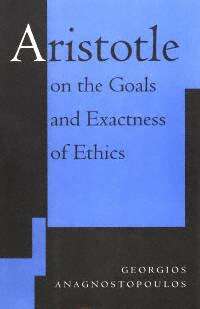 | Title: Aristotle on the goals and exactness of ethics Author: Anagnostopoulos, Georgios Published: University of California Press, 1994 Subjects: Philosophy | Classical Philosophy Publisher's Description: Philosophers as diverse as Socrates, Plato, Spinoza, and Rawls have sometimes argued that ethics can be an exact discipline whose propositions can match the exactness we associate with mathematics. Yet for Aristotle, knowledge of ethical matters is essentially inexact, and his perceptive criticisms of the Socratic-Platonic ideal of ethical knowledge and its metaphysical presuppositions remain of enduring interest to contemporary moral theorists.Georgios Anagnostopoulos offers the most systematic and comprehensive critical examination to date of Aristotle's views on the exactness of ethics. Combining rigorous philosophical argument and close analysis of the philosopher's treatises on human conduct, he gives form to Aristotle's belief that knowledge of matters of conduct, not unlike knowledge of most natural phenomena, can never be free of certain kinds of inexactness. He concludes that according to Aristotle, ethics constitutes a mode of knowledge that is neither totally nondemonstrative on account of its inexactness nor free of the important epistemological difficulties common to all nonmathematical disciplines. [brief] Similar Items |
| 2. | 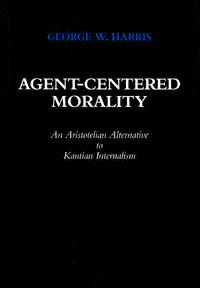 | Title: Agent-centered morality: an Aristotelian alternative to Kantian internalism Author: Harris, George W Published: University of California Press, 1999 Subjects: Philosophy Publisher's Description: What kinds of persons do we aspire to be, and how do our aspirations fit with our ideas of rationality? In Agent-Centered Morality , George Harris argues that most of us aspire to a certain sort of integrity: We wish to be respectful of and sympathetic to others, and to be loving parents, friends, and members of our communities. Against a prevailing Kantian consensus, Harris offers an Aristotelian view of the problems presented by practical reason, problems of integrating all our concerns into a coherent, meaningful life in a way that preserves our integrity. The task of solving these problems is "the integration test."Systematically addressing the work of major Kantian thinkers, Harris shows that even the most advanced contemporary versions of the Kantian view fail to integrate all of the values that correspond to what we call a moral life. By demonstrating how the meaning of life and practical reason are internally related, he constructs from Aristotle's thought a conceptual scheme that successfully integrates all the characteristics that make a life meaningful, without jeopardizing the place of any. Harris's elucidation of this approach is a major contribution to debates on human agency, practical reason, and morality. [brief] Similar Items |
| 3. | 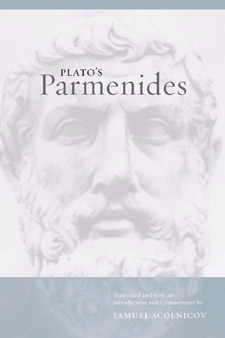 | Title: Plato's Parmenides Author: Plato Published: University of California Press, 2003 Subjects: Classics | Philosophy | Classical Philosophy Publisher's Description: Of all Plato's dialogues, the Parmenides is notoriously the most difficult to interpret. Scholars of all periods have disagreed about its aims and subject matter. The interpretations have ranged from reading the dialogue as an introduction to the whole of Platonic metaphysics to seeing it as a collection of sophisticated tricks, or even as an elaborate joke. This work presents an illuminating new translation of the dialogue together with an extensive introduction and running commentary, giving a unified explanation of the Parmenides and integrating it firmly within the context of Plato's metaphysics and methodology. Scolnicov shows that in the Parmenides Plato addresses the most serious challenge to his own philosophy: the monism of Parmenides and the Eleatics. In addition to providing a serious rebuttal to Parmenides, Plato here re-formulates his own theory of forms and participation, arguments that are central to the whole of Platonic thought, and provides these concepts with a rigorous logical and philosophical foundation. In Scolnicov's analysis, the Parmenides emerges as an extension of ideas from Plato's middle dialogues and as an opening to the later dialogues. Scolnicov's analysis is crisp and lucid, offering a persuasive approach to a complicated dialogue. This translation follows the Greek closely, and the commentary affords the Greekless reader a clear understanding of how Scolnicov's interpretation emerges from the text. This volume will provide a valuable introduction and framework for understanding a dialogue that continues to generate lively discussion today. [brief] Similar Items |
| 4. | 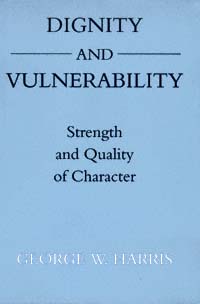 | Title: Dignity and vulnerability: strength and quality of character Author: Harris, George W Published: University of California Press, 1997 Subjects: Philosophy Publisher's Description: In this significant new addition to moral theory, George Harris challenges a view of the dignity and worth of persons that goes back through Kant and Christianity to the Stoics. He argues that we do not, in fact, believe this view, which traces any breakdowns of character to failures of strength. When it comes to what we actually value in ourselves and others, he says, we are far more Greek than Christian. At the most profound level, we value ourselves as natural organisms, as animals, rather than as godlike beings who transcend nature.The Kantian-Christian-Stoic tradition holds that if we were fully able to realize our dignity as Kantians, Christians, or Stoics, we would be better, stronger people, and therefore less vulnerable to character breakdown. Dignity and Vulnerability offers an opposing view, that sometimes character breaks down not because of some shortcoming in it but because of what is good about it, because of the very virtues and features of character that give us our dignity. If dignity can make us fragile and vulnerable to breakdown, then breakdown can be benign as well as harmful, and thus the conceptions of human dignity embedded in the tradition leading up to Kant are deeply mistaken. Harris proposes a foundation for our belief in human dignity in what we can actually know about ourselves, rather than in metaphysical or theological fantasy. Having gained this knowledge, we can understand the source of real strength. [brief] Similar Items |
| 5. | 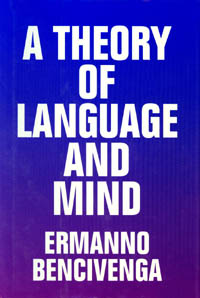 | Title: A theory of language and mind Author: Bencivenga, Ermanno 1950- Published: University of California Press, 1997 Subjects: Philosophy Publisher's Description: In his most recent book, Ermanno Bencivenga offers a stylistically and conceptually exciting investigation of the nature of language, mind, and personhood and the many ways the three connect. Bencivenga, one of the most iconoclastic voices to emerge in contemporary American philosophy, contests the basic assumptions of analytic (and also, to an extent, postmodern) approaches to these topics. His exploration leads through fascinating discussions of education, courage, pain, time and history, selfhood, subjectivity and objectivity, reality, facts, the empirical, power and transgression, silence, privacy and publicity, and play - all themes that are shown to be integral to our thinking about language. Relentessly bending the rules, Bencivenga frustrates our expectations of a "proper" theory of language. He invokes the transgressions of Nietzsche and Wittgenstein even as he appropriates the aphoristic style of Wittgenstein's Tractatus . Written in a philosophically playful and experimental mode, A Theory of Language and Mind draws the reader into a sense of continual surprise, therapeutic discomfort, and discovery. [brief] Similar Items |
| 6. | 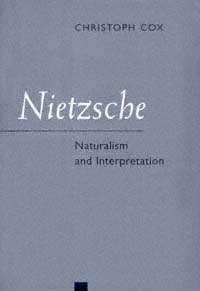 | Title: Nietzsche: naturalism and interpretation Author: Cox, Christoph 1965- Published: University of California Press, 1999 Subjects: Philosophy Publisher's Description: Nietzsche: Naturalism and Interpretation offers a resolution of one of the most vexing problems in Nietzsche scholarship. As perhaps the most significant predecessor of more recent attempts to formulate a postmetaphysical epistemology and ontology, Nietzsche is considered by many critics to share this problem with his successors: How can an antifoundationalist philosophy avoid vicious relativism and legitimate its claim to provide a platform for the critique of arguments, practices, and institutions?Christoph Cox argues that Nietzsche successfully navigates between relativism and dogmatism, accepting the naturalistic critique of metaphysics and theology provided by modern science, yet maintaining that a thoroughgoing naturalism must move beyond scientific reductionism. It must accept a central feature of aesthetic understanding: acknowledgment of the primacy and irreducibility of interpretation. This view of Nietzsche's doctrines of perspectivism, becoming, and will to power as products of an overall naturalism balanced by a reciprocal commitment to interpretationism will spur new discussions of epistemology and ontology in contemporary thought. [brief] Similar Items |
| 7. | 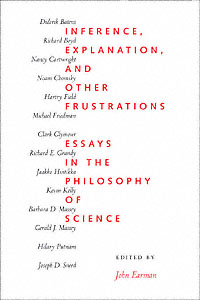 | Title: Inference, explanation, and other frustrations: essays in the philosophy of science Author: Earman, John Published: University of California Press, 1992 Subjects: Philosophy | History and Philosophy of Science Publisher's Description: These provocative essays by leading philosophers of science exemplify and illuminate the contemporary uncertainty and excitement in this changing field. The papers are rich in new perspectives, and their far-reaching criticisms challenge arguments long prevalent in classic philosophical problems of induction, empiricism, and realism. By turns empirical or analytic, historical or programmatic, confessional or argumentative, the authors' arguments both describe and demonstrate the fact that philosophy of science is in a ferment more intense than at any time since the heyday of logical positivism seventy years ago. [brief] Similar Items |
| 8. | 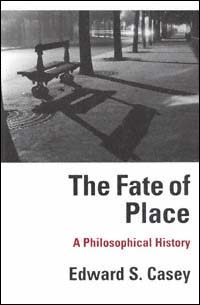 | Title: The fate of place: a philosophical history Author: Casey, Edward S 1939- Published: University of California Press, 1997 Subjects: Philosophy | Classical Philosophy | Architecture | Intellectual History | Geography Publisher's Description: In this imaginative and comprehensive study, Edward Casey, one of the most incisive interpreters of the Continental philosophical tradition, offers a philosophical history of the evolving conceptualizations of place and space in Western thought. Not merely a presentation of the ideas of other philosophers, The Fate of Place is acutely sensitive to silences, absences, and missed opportunities in the complex history of philosophical approaches to space and place. A central theme is the increasing neglect of place in favor of space from the seventh century A.D. onward, amounting to the virtual exclusion of place by the end of the eighteenth century.Casey begins with mythological and religious creation stories and the theories of Plato and Aristotle and then explores the heritage of Neoplatonic, medieval, and Renaissance speculations about space. He presents an impressive history of the birth of modern spatial conceptions in the writings of Newton, Descartes, Leibniz, and Kant and delineates the evolution of twentieth-century phenomenological approaches in the work of Husserl, Merleau-Ponty, Bachelard, and Heidegger. In the book's final section, Casey explores the postmodern theories of Foucault, Derrida, Tschumi, Deleuze and Guattari, and Irigaray. [brief] Similar Items |
| 9. | 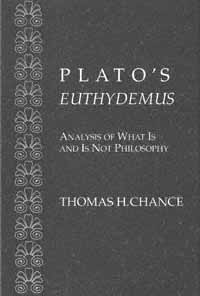 | Title: Plato's Euthydemus: analysis of what is and is not philosophy Author: Chance, Thomas H Published: University of California Press, 1992 Subjects: Philosophy | Social and Political Thought | Classical Philosophy | Literature Publisher's Description: With Plato's Euthydemus , Thomas Chance solves a longstanding riddle of Platonic studies. Thought to be an early, immature work, the Euthydemus has come across to scholars as lacking Plato's characteristic greatness. This apparent lack, Chance argues, is not a failure of the text but of scholarly perception. He advances a single thesis: that Plato deliberately presents eristic - contentious debate - as the antithesis to his own philosophical method. Once this thesis is accepted, the "hidden" purpose of the Euthydemus becomes manifest: Plato has used the occasion of his dialogue to combine a brilliantly crafted parody of sophistic antilogy with a subtle yet forceful exhortation designed to persuade all of us to pursue virtue and to love wisdom. [brief] Similar Items |
| 10. |  | Title: Descartes's imagination: proportion, images, and the activity of thinking Author: Sepper, Dennis L Published: University of California Press, 1996 Subjects: Philosophy | History and Philosophy of Science Publisher's Description: Renè Descartes is commonly portrayed as a strict rationalist, a philosopher who theorized a radical, unresolvable split between mind and body. In this long-overdue examination of the role of imagination in Descartes's thought, Dennis Sepper reveals a Descartes quite different from the usual dualistic portrayals and offers a critical reconception of the genesis and nature of the philosopher's thought.In a vigorous analysis of the less-known early works, Sepper finds that initially Descartes assigned the imagination a central role in the mind's activity. Although Descartes eventually lost confidence in the philosophy of imagination, an early understanding of its central role in cognition came to shape the most fundamental notions of his mature philosophy. Sepper's radical reassessment of Descartes ultimately raises new questions about the development of modern philosophy. [brief] Similar Items |
| 11. | 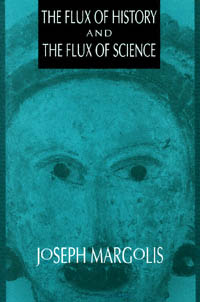 | Title: The flux of history and the flux of science Author: Margolis, Joseph 1924- Published: University of California Press, 1993 Subjects: Philosophy | History and Philosophy of Science Publisher's Description: Does thinking have a history? If there are no necessarily changeless structures to be found in things and in our inquiry into them, then what knowledge of the world and ourselves is possible? In this boldly original and elegantly written study, Joseph Margolis argues for a radically historicized view of history that treats it as both a real process and a narrative account, each a product of continual change. Developing his argument through discussions of such influential philosophers of history and the natural sciences as Vico, Danto, Collingwood, Habermas, Hempel, Popper, Putnam, and Gadamer, he provides a coherent theory of flux and invariance that resolves several deep puzzles regarding human nature and understanding.While maintaining a thorough command of Anglo-American philosophy, Margolis challenges many of its most cherished assumptions and demonstrates the sense in which history and interpretation are one and the same. Exploring one of the master themes of this century, his book offers a novel theory of the human condition whose conclusions and concerns seem certain to inform philosophy in the next century as well. [brief] Similar Items |
| 12. | 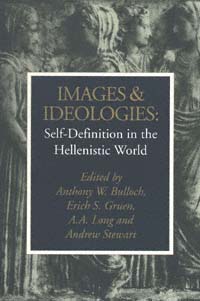 | Title: Images and ideologies: self-definition in the Hellenistic world Author: Bulloch, A. W Published: University of California Press, 1994 Subjects: Classics | Philosophy | Classical Philosophy | Ancient History | Art History Publisher's Description: This volume captures the individuality, the national and personal identity, the cultural exchange, and the self-consciousness that have long been sensed as peculiarly potent in the Hellenistic world. The fields of history, literature, art, philosophy, and religion are each presented using the format of two essays followed by a response.Conveying the direction and focus of Hellenistic learning, eighteen leading scholars discuss issues of liberty versus domination, appropriation versus accommodation, the increasing diversity of citizen roles and the dress and gesture appropriate to them, and the accompanying religious and philosophical ferment. The result is an arresting view of the incredible and unprecedented diversity of the Hellenistic world. [brief] Similar Items |
| 13. | 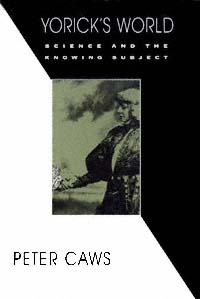 | Title: Yorick's world: science and the knowing subject Author: Caws, Peter Published: University of California Press, 1993 Subjects: Philosophy | History and Philosophy of Science Publisher's Description: Peter Caws provides a fresh and often iconoclastic treatment of some of the most vexing problems in the philosophy of science: explanation, induction, causality, evolution, discovery, artificial intelligence, and the social implications of technological rationality.Caws's work has been shaped equally by the insights of Continental philosophy and a concern with scientific practice. In these twenty-eight essays spanning more than a quarter of a century, he ranges from discussions of the work of French philosopher Gaston Bachelard, to relations between science and surrealism, to the concept of intentionality, to the limits of quantitative description. A lively mix of history, theory, speculation, and analysis, Yorick's World presents a vision of science that includes human history and social life. It will interest professional philosophers and scientists, and at the same time its directness will make it readily accessible to nontechnical readers. [brief] Similar Items |
| 14. | 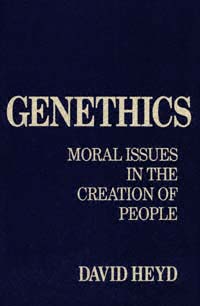 | Title: Genethics: moral issues in the creation of people Author: Heyd, David Published: University of California Press, 1992 Subjects: Philosophy | Ethics Publisher's Description: Unprecedented advances in medicine, genetic engineering, and demographic forecasting raise new questions that strain the categories and assumptions of traditional ethical theories. Heyd's approach resolves many paradoxes in intergenerational justice, while offering a major test case for the profound . . . [more] Similar Items |
| 15. | 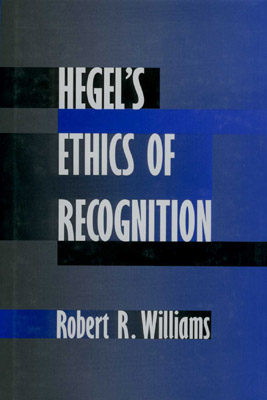 | Title: Hegel's ethics of recognition Author: Williams, Robert R 1939- Published: University of California Press, 1998 Subjects: Philosophy | Ethics Publisher's Description: In this significant contribution to Hegel scholarship, Robert Williams develops the most comprehensive account to date of Hegel's concept of recognition ( Anerkennung ). Fichte introduced the concept of recognition as a presupposition of both Rousseau's social contract and Kant's ethics. Williams shows that Hegel appropriated the concept of recognition as the general pattern of his concept of ethical life, breaking with natural law theory yet incorporating the Aristotelian view that rights and virtues are possible only within a certain kind of community.He explores Hegel's intersubjective concept of spirit ( Geist ) as the product of affirmative mutual recognition and his conception of recognition as the right to have rights. Examining Hegel's Jena manuscripts, his Philosophy of Right , the Phenomenology of Spirit , and other works, Williams shows how the concept of recognition shapes and illumines Hegel's understandings of crime and punishment, morality, the family, the state, sovereignty, international relations, and war. A concluding chapter on the reception and reworking of the concept of recognition by contemporary thinkers including Derrida, Levinas, and Deleuze demonstrates Hegel's continuing centrality to the philosophical concerns of our age. [brief] Similar Items |
| 16. | 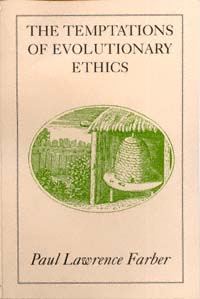 | Title: The temptations of evolutionary ethics Author: Farber, Paul Lawrence 1944- Published: University of California Press, 1994 Subjects: Philosophy | History | Ethics | History and Philosophy of Science Publisher's Description: Evolutionary theory tells us about our biological past; can it also guide us to a moral future? Paul Farber's compelling book describes a century-old philosophical hope held by many biologists, anthropologists, psychologists, and social thinkers: that universal ethical and social imperatives are built into human nature and can be discovered through knowledge of evolutionary theory.Farber describes three upsurges of enthusiasm for evolutionary ethics. The first came in the early years of mid-nineteenth century evolutionary theories; the second in the 1920s and '30s, in the years after the cultural catastrophe of World War I; and the third arrived with the recent grand claims of sociobiology to offer a sound biological basis for a theory of human culture.Unlike many who have written on evolutionary ethics, Farber considers the responses made by philosophers over the years. He maintains that their devastating criticisms have been forgotten - thus the history of evolutionary ethics is essentially one of oft-repeated philosophical mistakes.Historians, scientists, social scientists, and anyone concerned about the elusive basis of selflessness, altruism, and morality will welcome Farber's enlightening book. [brief] Similar Items |
| 17. | 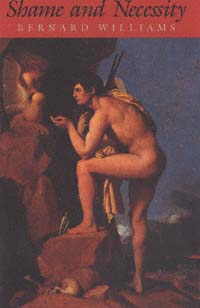 | Title: Shame and necessity Author: Williams, Bernard Arthur Owen Published: University of California Press, 1993 Subjects: Philosophy | Ethics | Classics | Classical Philosophy | Literary Theory and Criticism Publisher's Description: We tend to suppose that the ancient Greeks had primitive ideas of the self, of responsibility, freedom, and shame, and that now humanity has advanced from these to a more refined moral consciousness. Bernard Williams's original and radical book questions this picture of Western history. While we are in many ways different from the Greeks, Williams claims that the differences are not to be traced to a shift in these basic conceptions of ethical life. We are more like the ancients than we are prepared to acknowledge, and only when this is understood can we properly grasp our most important differences from them, such as our rejection of slavery.The author is a philosopher, but much of his book is directed to writers such as Homer and the tragedians, whom he discusses as poets and not just as materials for philosophy. At the center of his study is the question of how we can understand Greek tragedy at all, when its world is so far from ours.Williams explains how it is that when the ancients speak, they do not merely tell us about themselves, but about ourselves. Shame and Necessity gives a new account of our relations to the Greeks, and helps us to see what ethical ideas we need in order to live in the modern world. [brief] Similar Items |
| 18. | 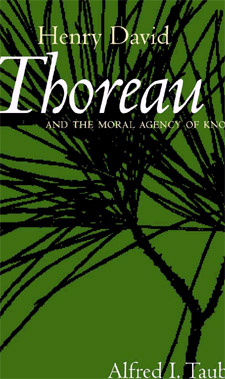 | Title: Henry David Thoreau and the moral agency of knowing Author: Tauber, Alfred I Published: University of California Press, 2001 Subjects: Philosophy | Literature | History and Philosophy of Science | Ethics Publisher's Description: In his graceful philosophical account, Alfred I. Tauber shows why Thoreau still seems so relevant today - more relevant in many respects than he seemed to his contemporaries. Although Thoreau has been skillfully and thoroughly examined as a writer, naturalist, mystic, historian, social thinker, Transcendentalist, and lifelong student, we may find in Tauber's portrait of Thoreau the moralist a characterization that binds all these aspects of his career together. Thoreau was caught at a critical turn in the history of science, between the ebb of Romanticism and the rising tide of positivism. He responded to the challenges posed by the new ideal of objectivity not by rejecting the scientific worldview, but by humanizing it for himself. Tauber portrays Thoreau as a man whose moral vision guided his life's work. Each of Thoreau's projects reflected a self-proclaimed "metaphysical ethics," an articulated program of self-discovery and self-knowing. By writing, by combining precision with poetry in his naturalist pursuits and simplicity with mystical fervor in his daily activity, Thoreau sought to live a life of virtue - one he would characterize as marked by deliberate choice. This unique vision of human agency and responsibility will still seem fresh and contemporary to readers at the start of the twenty-first century. [brief] Similar Items |
| 19. | 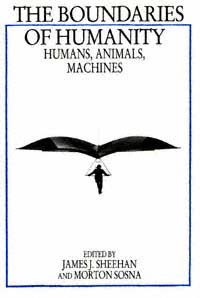 | Title: The Boundaries of humanity: humans, animals, machines Author: Sheehan, James J Published: University of California Press, 1991 Subjects: Philosophy | History and Philosophy of Science | Biology | Technology and Society Publisher's Description: To the age-old debate over what it means to be human, the relatively new fields of sociobiology and artificial intelligence bring new, if not necessarily compatible, insights. What have these two fields in common? Have they affected the way we define humanity? These and other timely questions are addressed with colorful individuality by the authors of The Boundaries of Humanity .Leading researchers in both sociobiology and artificial intelligence combine their reflections with those of philosophers, historians, and social scientists, while the editors explore the historical and contemporary contexts of the debate in their introductions. The implications of their individual arguments, and the often heated controversies generated by biological determinism or by mechanical models of mind, go to the heart of contemporary scientific, philosophical, and humanistic studies. [brief] Similar Items |
| 20. | 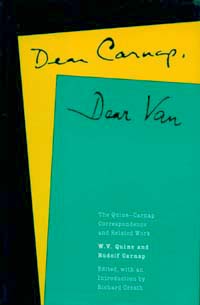 | Title: Dear Carnap, dear Van: the Quine-Carnap correspondence and related work Author: Carnap, Rudolf 1891-1970 Published: University of California Press, 1991 Subjects: Philosophy | History and Philosophy of Science | Autobiographies and Biographies Publisher's Description: Rudolf Carnap and W. V. Quine, two of the twentieth century's most important philosophers, corresponded at length - and over a long period of time - on matters personal, professional, and philosophical. Their friendship encompassed issues and disagreements that go to the heart of contemporary philosophic discussions. Carnap (1891-1970) was a founder and leader of the logical positivist school. The younger Quine (1908-) began as his staunch admirer but diverged from him increasingly over questions in the analysis of meaning and the justification of belief. That they remained close, relishing their differences through years of correspondence, shows their stature both as thinkers and as friends. The letters are presented here, in full, for the first time.The substantial introduction by Richard Creath offers a lively overview of Carnap's and Quine's careers and backgrounds, allowing the nonspecialist to see their writings in historical and intellectual perspective. Creath also provides a judicious analysis of the philosophical divide between them, showing how deep the issues cut into the discipline, and how to a large extent they remain unresolved. Dear Carnap, I enclose a copy of a paper which I am ready to send off for publication. . . . I am anxious to have you look this over as soon as possible, to see whether you have reason to suppose the system contradictory: for it looks dangerous. Dear Quine: I read your paper very carefully and with the highest interest. . . . So far, I do not see any contradiction in the system itself . . . but I share your feeling that the whole looks rather dangerous. [brief] Similar Items |